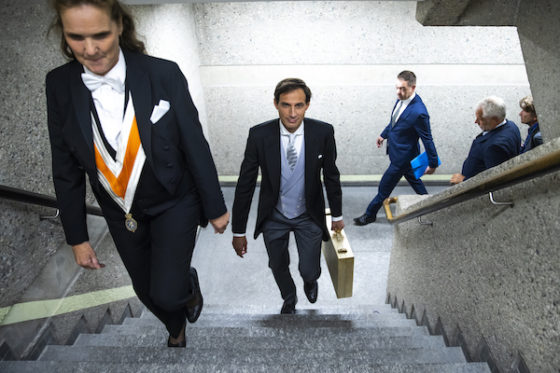No major policy initiatives but here are the main points of the budget


The economic prospects for the immediate future are promising and projections by the government’s macro-economic think-tank CPB are better than expected, with growth next year put at 3.5%, finance minister Wopke Hoekstra told MPs on Tuesday afternoon.
The relatively good figures are mainly down to ‘the way businesses and individuals have adapted [to coronavirus] and to the government support packages,’ Hoekstra said as he presented the cabinet’s 2022 spending plans to parliament.
In particular, developments on the jobs market are positive, with almost 70% of 15 to 75-year-olds having some form of paid employment. Nevertheless, spending power will remain flat with most households having the same, or marginally more to spend in 2022, Hoekstra said.
The cabinet is currently in a caretaker role, and so the budget does not include any major policy initiatives. Here are the main points:
Finance
- The budget deficit will reach 6% this year and fall to 2.4% in 2022
- A further €1.1bn will be spent on compensating people who lost money because of the childcare benefit scandal, taking the total cost to €5bn
- Employers will be able to give people working home a tax free allowance of €2 per day to cover their expenses
Climate change
- Just under €7bn for climate change, in particular subsidies for sustainable energy and to reduce carbon dioxide emissions in line with the Urgenda court case ruling. €514m will go on subsidies to insulate homes and €288m for hybrid heat pump installations
- €90m in subsidies to stimulate the use of electric cars and €28m to help companies buy electric vans
- The price of electric cars eligible for the company car tax break (16% rather than 22%) will go down from €40,000 to €35,000
- €1.3bn for international efforts to combat climate change
Education
- No additional spending on education apart from the €8.5bn announced earlier to help schools deal with backlogs and delays caused by the coronavirus closures and €800m to boost the number of teachers
Housing
- €1bn over 10 years to stimulate the development of new housing. Local authorities will be able to apply for extra funding
- No new measures to combat nitrogen compound pollution, which has had a major impact on the construction of new housing. That will be up to the next cabinet
Health
- Health insurance is forecast to increase by €2.75 per month, although the exact rise is up to health insurers to fix. Such a rise would take the average premium to €121.25 a month
- Healthcare benefits will rise €3 to compensate low income households for the increase
- The own risk element in healthcare remains €385 per year
- €2bn for further combating the impact of coronavirus via testing and vaccinations
Law and order
- €500m per year to tackle the impact of organised crime, including security and police services
- €154m for legal aid, a plan backed by MPs earlier this year
Royal household
- The king will get €6,132,000 in wages and costs next year, €75,000 up on 2021. Queen Maxima’s salary will rise to €400,000 plus €667,000 for staff
Defence
- €200m extra for the armed forces, of which half will go on ammunition for use during exercises
This list will be updated as more details become available
Thank you for donating to DutchNews.nl.
We could not provide the Dutch News service, and keep it free of charge, without the generous support of our readers. Your donations allow us to report on issues you tell us matter, and provide you with a summary of the most important Dutch news each day.
Make a donation